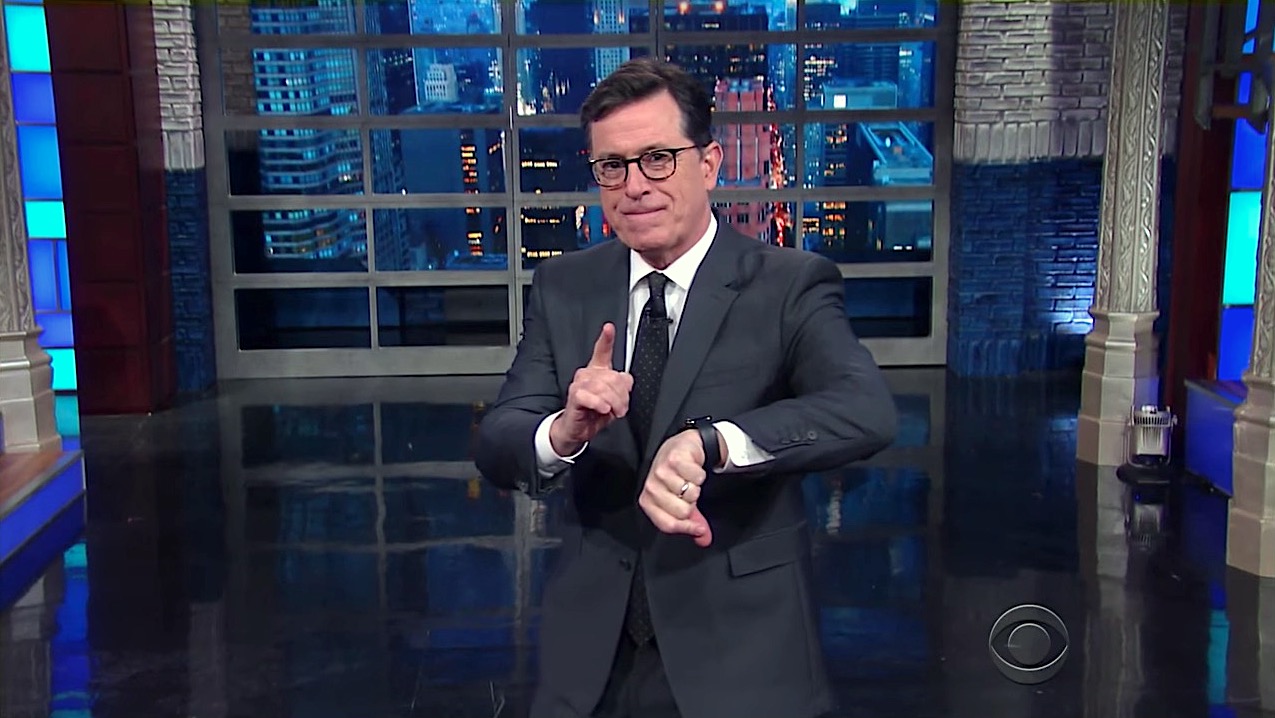Stephen Colbert has a big question about Donald Trump's Julian Assange tweets


A free daily email with the biggest news stories of the day – and the best features from TheWeek.com
You are now subscribed
Your newsletter sign-up was successful
On Thursday, Sen. John McCain's Senate Armed Services Committee held hearings on Russian hacking of the U.S. presidential election, and Stephen Colbert said on The Late Show that while the heads of the U.S. intelligence agencies said there's no doubt Russia was behind the hacks, President-elect Donald Trump has been listening more to "middle-aged Draco Malfoy" Julian Assange than U.S. spy chiefs. Or at least he had been — on Thursday morning, Trump appeared to back away from Assange in two tweets in which he said of Assange: "I simply state what he states, it is for the people.... to make up their own minds as to the truth."
"That's true leadership," Colbert said. "Just type any claim you hear and let people decide what's true. Like: 'Billy told me if a boy and a girl touch butts the girl gets pregnant. True? You decide. Sad!'" He and bandleader Jon Batiste got lost in that joke for a minute, then Colbert snapped back: "Here's what's really weird about Trump's Julian Assange tweet. He tweeted the first part of this sentence at 8:25 a.m., but finished the thought 20 minutes later. How can he have a plan for America when he doesn't have a plan for the end of a sentence?"
"But enough about hacking our democracy, let's get to the big news," Colbert said, meaning former American Idol runner-up Bo Bice complaining of "racial prejudice" because he was called "white boy" at a Popeye's Chicken in the Atlanta airport. After mocking Bice, Colbert ended with a Utah legislator's plan to open the pornography industry to lawsuits — and a look at what the inevitable TV ads for pornography lawyers might look like. Peter Weber
The Week
Escape your echo chamber. Get the facts behind the news, plus analysis from multiple perspectives.

Sign up for The Week's Free Newsletters
From our morning news briefing to a weekly Good News Newsletter, get the best of The Week delivered directly to your inbox.
From our morning news briefing to a weekly Good News Newsletter, get the best of The Week delivered directly to your inbox.
A free daily email with the biggest news stories of the day – and the best features from TheWeek.com
Peter has worked as a news and culture writer and editor at The Week since the site's launch in 2008. He covers politics, world affairs, religion and cultural currents. His journalism career began as a copy editor at a financial newswire and has included editorial positions at The New York Times Magazine, Facts on File, and Oregon State University.
-
 5 calamitous cartoons about the Washington Post layoffs
5 calamitous cartoons about the Washington Post layoffsCartoons Artists take on a new chapter in journalism, democracy in darkness, and more
-
 Political cartoons for February 14
Political cartoons for February 14Cartoons Saturday's political cartoons include a Valentine's grift, Hillary on the hook, and more
-
 Tourangelle-style pork with prunes recipe
Tourangelle-style pork with prunes recipeThe Week Recommends This traditional, rustic dish is a French classic
-
 ‘One Battle After Another’ wins Critics Choice honors
‘One Battle After Another’ wins Critics Choice honorsSpeed Read Paul Thomas Anderson’s latest film, which stars Leonardo DiCaprio, won best picture at the 31st Critics Choice Awards
-
 A peek inside Europe’s luxury new sleeper bus
A peek inside Europe’s luxury new sleeper busThe Week Recommends Overnight service with stops across Switzerland and the Netherlands promises a comfortable no-fly adventure
-
 Son arrested over killing of Rob and Michele Reiner
Son arrested over killing of Rob and Michele ReinerSpeed Read Nick, the 32-year-old son of Hollywood director Rob Reiner, has been booked for the murder of his parents
-
 Rob Reiner, wife dead in ‘apparent homicide’
Rob Reiner, wife dead in ‘apparent homicide’speed read The Reiners, found in their Los Angeles home, ‘had injuries consistent with being stabbed’
-
 Hungary’s Krasznahorkai wins Nobel for literature
Hungary’s Krasznahorkai wins Nobel for literatureSpeed Read László Krasznahorkai is the author of acclaimed novels like ‘The Melancholy of Resistance’ and ‘Satantango’
-
 Primatologist Jane Goodall dies at 91
Primatologist Jane Goodall dies at 91Speed Read She rose to fame following her groundbreaking field research with chimpanzees
-
 Florida erases rainbow crosswalk at Pulse nightclub
Florida erases rainbow crosswalk at Pulse nightclubSpeed Read The colorful crosswalk was outside the former LGBTQ nightclub where 49 people were killed in a 2016 shooting
-
 Trump says Smithsonian too focused on slavery's ills
Trump says Smithsonian too focused on slavery's illsSpeed Read The president would prefer the museum to highlight 'success,' 'brightness' and 'the future'
